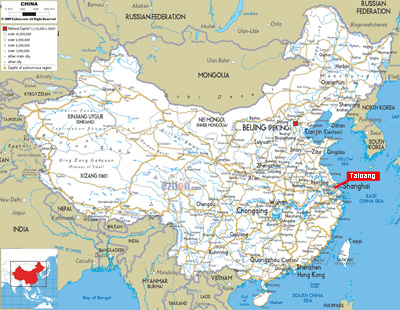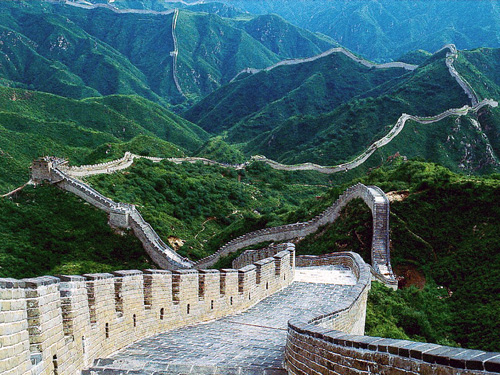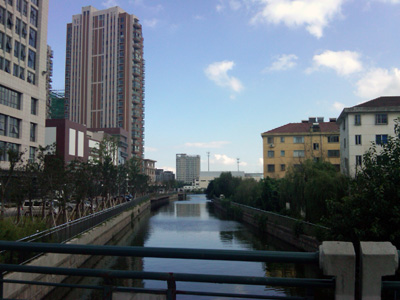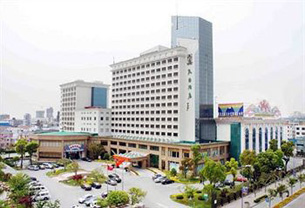China, officially the People’s Republic of China, in East Asia, is the world’s largest country by population and one of the largest by area, measuring about the same size as the United States. The Chinese call their country Zhongguo, which means 'Central Country' or 'Middle Kingdom'. The name China was given to it by foreigners and is probably based on a corruption of Qin, a Chinese dynasty that ruled during the 3rd century BC. China centers on the agricultural regions drained by three major rivers - the Huang He (Yellow River) in the north, the Yangtze (Chang Jiang) in central China, and the Zhu Jiang (Pearl River) in the south. The country’s varied terrain includes vast deserts, towering mountains, high plateaus, and broad plains. Beijing, located in the north, is China’s capital and its cultural, economic, and communications center. Shanghai, located near the Yangtze, is the most populous urban center, the largest industrial and commercial city, and mainland China’s leading port. One-fifth of the world’s population - 1.3 billion people - live in China. More than 90% of these are ethnic Han Chinese, but China also recognizes 55 national minorities, including Tibetans, Mongols, Uighurs, Zhuang, Miao, Yi, and many smaller groups. Even among the ethnic Han, there are regional linguistic differences. Although a common language called Putonghua is taught in schools and used by the mass media, local spoken languages are often mutually incomprehensible. However, the logographic writing system, which uses characters that represent syllables or words rather than pronunciation, makes it possible for all Chinese dialects to be written in the same way; this greatly aids communication across China.
In ancient times, China was East Asia’s dominant civilization. Other societies were strongly influenced by China, adopting features of Chinese art, food, material culture, philosophy, government, technology, and written language. For many centuries, especially from the 7th through the 14th century AD, China had the world's most advanced civilization. Inventions such as paper, printing, gunpowder, porcelain, silk, and the compass originated in China and then spread to other parts of the world. China’s political strength became threatened when European empires expanded into East Asia. Macao, a small territory on China’s southeastern coast, came under Portuguese control in the mid-16th century, and Hong Kong, nearby, became a British dependency in the 1840s. In the 19th century, internal revolts and foreign encroachment weakened China’s last dynasty, the Qing, which was finally overthrown by Chinese Nationalists in 1911.
In 1949 the Chinese Communist Party won the civil war and established the People’s Republic of China (PRC) on the mainland. In 1997 Hong Kong was transferred from Britain to China under an agreement that gave the region considerable autonomy. Portugal recognized Macao as Chinese territory in the late 1970s and negotiated the transfer of Macao’s administration from Portugal to China in 1999. Macao, too, was guaranteed a special degree of autonomy. On the mainland, after 1949, the Communist government began placing agriculture and industry under state control. Beginning in the late 1970s, however, the government implemented economic reforms that reversed some of the earlier policies and encouraged foreign investment. As a result China has become the world's fastest-growing major economy. As of 2012, it is the world's second-largest economy, after the United States, by both nominal gross domestic product (GDP) and purchasing power parity (PPP), and is also the world's largest exporter and second-largest importer of goods. On per capita terms, China ranked 90th by nominal GDP and 91st by GDP (PPP) in 2011, according to the International Monetary Fund (IMF). China is a recognized nuclear weapons state and has the world's largest standing army, with the second-largest defense budget. In 2003, China became the third nation in the world, after the former Soviet Union and the United States, to independently launch a successful manned space mission. China has been characterized as a potential superpower by a number of academics, military analysts, and public policy and economics analysts.
Taicang (pop. 500,000) is a coastal city in Jiangsu Province, in east China. It lies some 60 km to the northwest of Shanghai, and 60 km to the east of Suzhou, along the Yangtze River. The city traces its roots back to the Three Kingdoms era (220~280 AD), when Eastern Wu, one of the three states competing for control of China at the time, build storage facilities for agriculture products in this area. The literal meaning of Taicang is 'grand barn'. Taicang is a natural sea port, and because of this the city developed into a port city over the years. Its economy flourished in the Tang Dynasty (618-907 AD), but reached its peak in the Yuan dynasty (1271-1368) and continued as the number one port of the world in the next dynasty - Ming dynasty (1368-1644). Taicang became the place where Zheng He, the famous Chinese mariner, explorer, diplomat and fleet admiral (1371-1433) set off his voyages to explore the world. Traditionally Taicang was an agricultural land and its farming earning was the principal income of the city. The main agricultural products include rice, cotton, oil seed, livestock, and aquatic produces. However, in the past two decades, the city's annual revenue from the agricultural sector has been steadily shrinking. As a newly shaped industrial city, Taicang has been listed in the front of the 100 top Chinese cities for its comprehensive economic capability for three years in a row, with its booming economy and elegant municipal landscapes. Taicang has many tourist destinations to visit, including Zheng He Memorial Hall, Taicang Museum, Tianfei Palace, and a couple of bridges built in the Yuan Dynasty. The Championships will be played in the Stadium of Taicang. The Chinese Contract Bridge Association and the local Organizing Committee have arranged for full board accommodation to be available to all participants, as follows (rates per person, per night):
|
|||||||||||||||||||||||||||||||||||




